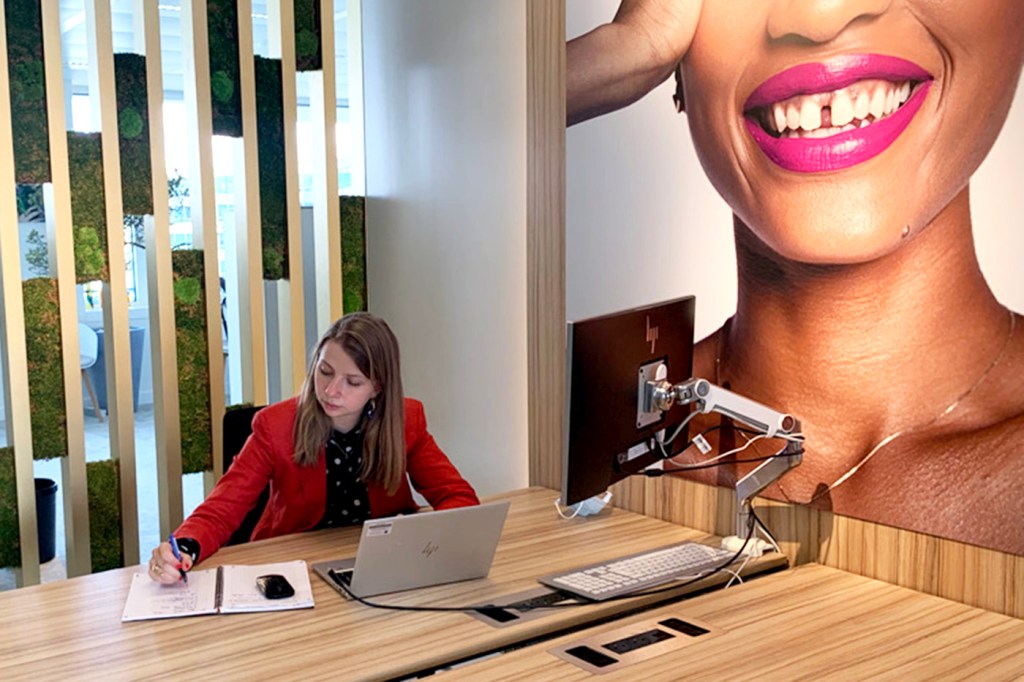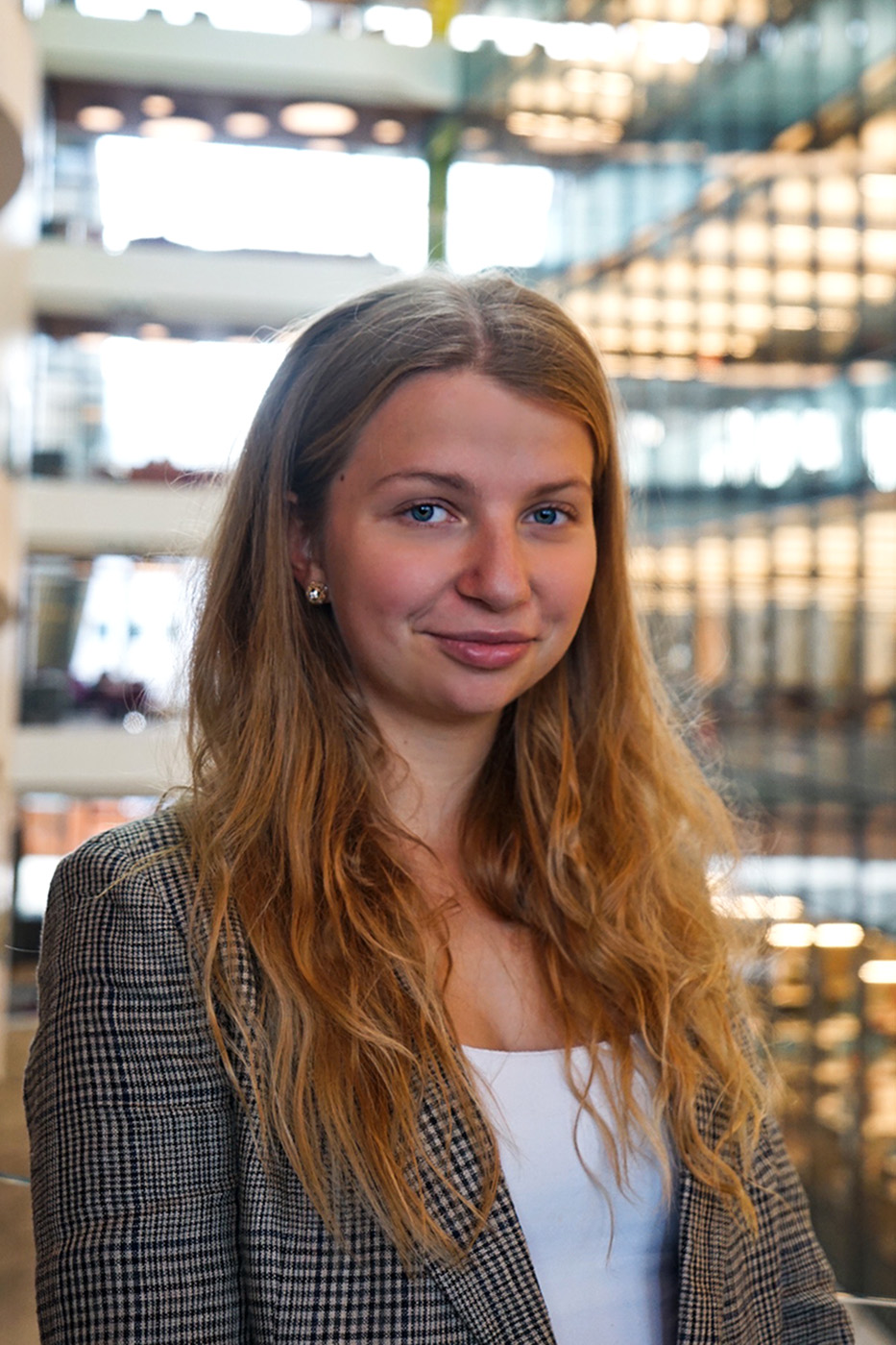Millions of dollars in cosmetics were stranded on the beached ship in the Suez Canal. Then this Northeastern co-op stepped in.

It was a Friday, and Kristine Aleksandrovica was eagerly looking ahead to hanging out with a friend over the weekend. But that morning her co-op manager at L’Oréal‘s headquarters in Paris called to say the cosmetic giant’s products were on a massive cargo vessel that was stuck diagonally in Egypt’s Suez Canal, halting all ship traffic. The third-year finance and supply chain business major sprang into action.
“We basically had 90 minutes to scramble and find all the shipments and figure out how much was affected [by the canal blockage],” she says in a fit of laughter from her apartment in the French capital. She still met up with the friend, albeit much later than she had hoped. The cargo shipments, however, still haven’t reached their destinations weeks after the vessel was freed.

“I’m talking with our suppliers to figure out how we can be a more efficient and greener company,” says Kristine Aleksandrovica of her L’Oréal co-op in Paris. Photo courtesy of Kristine Aleksandrovica
Her supply chain co-op in L’Oréal’s global transportation division largely deals with the environmental impact of ships, planes, trains and other carbon-producing modes of transportation. “I’m modeling how we can switch to a different mode and see if there are greener ways of shipping our products.”
The company has more than 150 global distribution centers that deliver more than seven billion products each year, according to information from L’Oréal. It is shifting delivery from road to rail and working to develop more environmentally-friendly delivery methods such as electric vehicles.
“I’m talking with our suppliers to figure out how we can be a more efficient and greener company,” Aleksandrovica explains. Her work doesn’t normally involve beached vessels blocking a critical trade waterway between Europe and Asia. The nearly week-long interruption in global trade was just the latest in a series of delays.
“The supply chain world in general is under heavy disruptions and many shipments since last year have been delayed because of COVID,” Aleksandrovica explains. “But this was something else.”
Not that she’s complaining about shifting on the fly. In fact, the Russian native is used to dealing with ambiguity. Co-ops at Northeastern helped her navigate the uncertainty.
Take the French’s elastic concept of time. Aleksandrovica had to get used to meetings frequently starting late when her L’Oréal co-op began in January. She adapted by working on something else right up to the minute when the meeting was supposed to commence.
“No one was going to be on time anyway,” she laughs. “It’s going to be very hard to adjust when I’m back in Boston and I have to always be on time.” She won’t have to worry about that until mid-July when the co-op winds down.
For now, Aleksandrovica appreciates how fortunate she is to be working in a cosmopolitan city brimming with quaint cobblestone streets, sidewalk cafes, and world-famous culture.
“I used to glamorize working here and thinking it’s all going to be just perfect.” That is, until a Shark Tank-like startup competition at L’Oréal went off the rails in a big way, thwarting months of work.
She took the setback personally, but the silver lining was that it was a learning opportunity. “I saw it as a redirection moment,” she confides.
Aleksandrovica learned self-awareness at an earlier co-op with the Boston Consulting Group, one of the world’s biggest management consulting firms. She worked on corporate finance issues but realized that she wanted something more dynamic.
“That really pushed me to think ‘OK, what am I passionate about?’”
That question was answered when she took a supply chain class at Northeastern and became hooked. “Supply chain affects all businesses and it’s the area where you can make the most change,” Aleksandrovica explains. “I want to make a positive impact on the world.”
Co-op offers avenues for those with similar ambitions, or different ones.
Overseas co-ops differ from U.S.-based opportunities because they offer a culturally immersive experience with a personal transformation aligned with a student’s career ambition, according to Aspa Papanastasiou, associate director of employer engagement and career design.
“As a global university we aspire to educate resilient, informed, compassionate lifelong learners. While our students are working and living abroad they enhance their capacity for holistic critical thinking, gain respect for other cultures, thrive in uniquely diverse teams, and give back to their host societies.”
Aleksandrovica remembers arriving on the Boston campus in her first year and wondering how students in clubs and co-ops could have the wherewithal to put themselves out there.
Being on her own in another country “taught me to deal with risk and uncertainty,” she recalls. “Things didn’t always go my way, but maybe it was a signal to point me in the direction of something bigger and greater. Redirection is not failure.”
For media inquiries, please contact media@northeastern.edu.